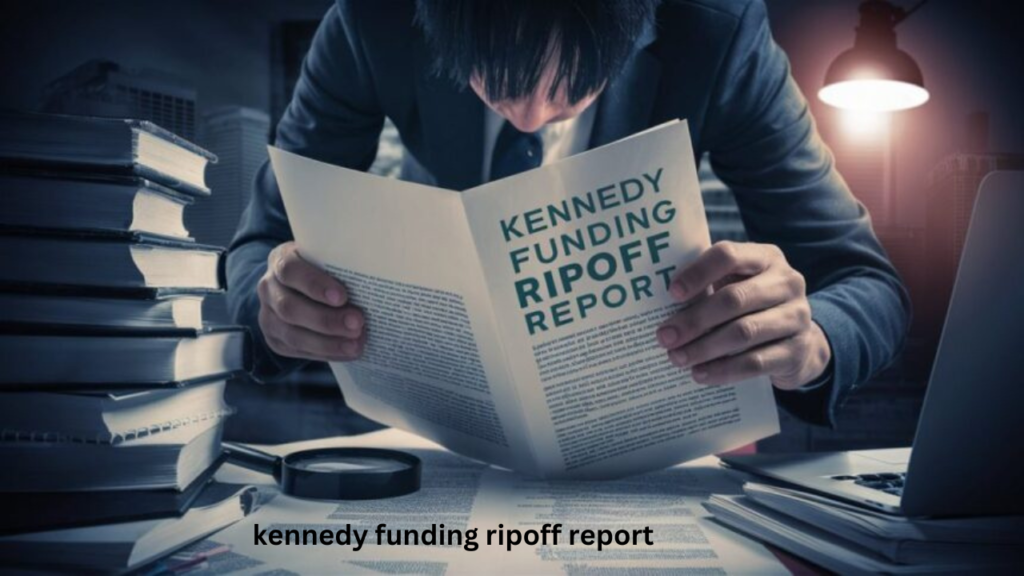In the realm of high-risk lending, Kennedy Funding has gained attention not only for its commercial financing services but also for the controversies surrounding its practices. Many potential borrowers have raised concerns through a “Kennedy Funding Ripoff Report,” alleging hidden fees, misleading loan terms, and aggressive collection tactics. In this blog post, we’ll explore these allegations, analyze their validity, and offer advice for those considering working with Kennedy Funding or other private lenders.
Understanding the Allegations
The core of the “Kennedy Funding Ripoff Report” revolves around several complaints that have been posted on consumer advocacy websites and forums. These complaints share a common theme: borrowers claiming to have been blindsided by fees and terms they did not fully understand at the onset of their loan agreement.
Some of the most frequent complaints include:
Undisclosed Fees: Many borrowers report encountering unexpected costs, such as high upfront fees, which were not made clear during initial discussions.
Misleading Loan Terms: Several clients allege that the final loan terms were different from what was initially promised, leading to financial stress and challenges in repayment.
Aggressive Collection Tactics: Borrowers have mentioned receiving threats of lawsuits and aggressive demands for payment, despite their attempts to negotiate or clarify terms.
These claims, especially when coupled with the financial challenges of high-risk loans, have led to widespread discussions on whether Kennedy Funding is operating within legal and ethical boundaries.
Kennedy Funding’s Response
To its credit, Kennedy Funding has addressed these allegations, maintaining that their business practices are entirely transparent and in line with industry norms. The company argues that many complaints stem from misunderstandings about the nature of high-risk lending, particularly bridge loans.
In high-risk loans, it’s common for lenders to charge higher fees to compensate for the increased risk they take on. This explains why Kennedy Funding, like other private lenders, requires upfront fees for services such as appraisals, legal reviews, and collateral assessments. However, many borrowers, particularly those unfamiliar with these practices, interpret these fees as hidden charges, leading to dissatisfaction.
Kennedy Funding also emphasizes that they operate within the bounds of legal regulations, and that all loan terms are disclosed upfront. They claim that the issues raised in the “Kennedy Funding Ripoff Report” are from borrowers who did not fully understand the commercial loan landscape, particularly the higher costs associated with non-traditional financing.
Are These Allegations Valid?
As with any business operating in the high-risk space, complaints are inevitable. However, to assess whether the “Kennedy Funding Ripoff Report” holds weight, it’s important to consider several factors.
Industry Norms: High upfront fees and strict repayment terms are common in the world of bridge loans and commercial lending. These loans are typically short-term and cater to borrowers who cannot secure traditional financing. As a result, the costs are inherently higher, and the risk is greater. While this doesn’t excuse unethical practices, it does explain why Kennedy Funding’s fees may seem steep compared to conventional lenders.
Borrower Expectations: Many complaints appear to stem from a lack of understanding on the borrower’s part. It’s crucial for anyone seeking a commercial loan to thoroughly review all terms and fees before signing any agreements. Misunderstandings can arise when borrowers expect traditional lending terms in a high-risk lending environment.
Legal Standing: Kennedy Funding operates within legal regulations and has not been found guilty of fraudulent practices. While complaints exist, no major legal actions have been taken against the company that would suggest widespread unethical behavior.
Tips for Borrowers
Whether you’re considering a loan from Kennedy Funding or another private lender, it’s essential to take steps to protect yourself from potential pitfalls. Here are a few tips:
Do Your Research: Before engaging with any lender, research their reputation thoroughly. Read reviews, search for any “ripoff reports,” and weigh the experiences of other borrowers. Understanding both the positive and negative feedback can give you a clearer picture of what to expect.
Understand the Terms: Make sure you fully comprehend the loan terms, including all fees, interest rates, and repayment schedules. If anything is unclear, don’t hesitate to ask questions. It’s better to delay signing than to rush into an agreement that could cost you in the long run.
Consult a Financial Expert: If you’re unfamiliar with high-risk loans, consider seeking advice from a financial advisor. They can help you evaluate whether the terms are reasonable and whether the loan is in your best interest.
Be Wary of Upfront Fees: While some upfront fees are standard in commercial lending, be cautious if the fees seem excessively high or if the lender is pressuring you to pay quickly. Always get a breakdown of what the fees are for and how they contribute to the loan process.
Compare Multiple Lenders: Don’t settle for the first lender you find. Comparing offers from multiple lenders can help you gauge whether you’re getting a fair deal. Even if you’re dealing with high-risk financing, you still have options.
Conclusion
The “Kennedy Funding Ripoff Report” highlights some of the challenges borrowers face when dealing with high-risk lenders. While Kennedy Funding maintains that its practices are transparent and legal, the experiences shared by borrowers suggest that there may be room for improvement in communication and transparency.
Ultimately, it’s up to borrowers to protect themselves by doing their due diligence, understanding the terms of their loans, and seeking professional advice when needed. By taking these steps, you can avoid falling victim to potential misunderstandings or unfavorable loan terms, whether with Kennedy Funding or any other lender.
Remember, when it comes to high-risk lending, knowledge is your best defense.
